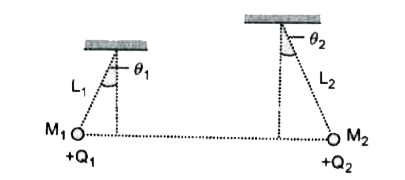Light of wavelength 5000Å and intensity 39.8Wm−1 is incident on a metal surface. If only 1% photons of incident light emit photoelectrons, then the number of electrons emitted per second per unit area from the surface will be nearly : Solution in Kannada
1018
1020
1022
1024
The correct Answer is:A
E=nh⇒E=nhcλ
⇒n=Eλhc
But n=n100=Eλ100hc=1018
Topper's Solved these Questions
- ELECTRONS & PHOTONSBOOK - MODERN PUBLICATIONCHAPTER - ELECTRONS & PHOTONSEXERCISE - MULTIPLE CHOICE QUESTIONS (LEVEL-III)
9 Videos
- ELECTRONS & PHOTONSBOOK - MODERN PUBLICATIONCHAPTER - ELECTRONS & PHOTONSEXERCISE - RECENT COMPETITIVE QUESTIONS
20 Videos
- ELECTRONS & PHOTONSBOOK - MODERN PUBLICATIONCHAPTER - ELECTRONS & PHOTONSEXERCISE - RECENT COMPETITIVE QUESTIONS
20 Videos
- ELECTROMAGNETIC WAVESBOOK - MODERN PUBLICATIONCHAPTER - ELECTROMAGNETIC WAVESEXERCISE - RECENT COMPETITIVE QUESTIONS
4 Videos
- ELECTROSTATICSBOOK - MODERN PUBLICATIONCHAPTER - ELECTROSTATICSEXERCISE - RECENT COMPETITIVE QUESTIONS
39 Videos
Similar Questions
Energy required for the electron excitation in Li++ from the first to the third Bohr orbit is :
View SolutionAccording to Einstein's photoelectric equation the graph of K.E. of the photoelectron emitted from the metal versus the frequency of the incident radiation gives a straight line graph whose slope
View SolutionAccording to Einstein's photoelectric equation the graph of K.E. of the photoelectron emitted from the metal versus the frequency of the incident radiation gives a straight line graph whose slope
View SolutionThe speed of electromagnetic wave in vacuum depends upon the source of radiation
View SolutionTwo small spheres of masses M1andM2 are suspended by weightless insulating threads of lengths L1andL2 The spheres carry charges Q1andq2 respectively . The spheres are suspended such that they are in level with one another and the threads are inclined to the vertical at angles of θ1andθ2 as shown . Which one o fthe following conditions , if θ1=θ2 ?

View SolutionUltraviolet light of wavelength 300nn and intensity 1.0Wm−2 falls on the surface of a photosensitive material. If one per cent of the incident photons produce photoelectrons, then the number of photoelectrons emitted per second from an area of 1.0 cm2 of the surface is nearly
View SolutionLight rays of wavelength 6000A∘ and of photon intensity 39.6was/m2 is incident on a metal surface. If only one percent of photons incident on the surface of electons emitted per second unit area from the surface will be [Planck constant =6.64×10−34J−S,Velocity of light =3×108ms−1]
View SolutionUltraviolet light of wavelength 66.26 nm and intensity 2W/m2 falls on potassium surface by which photoelectrons are ejected out. If only 0.1% of the incident photons produce photoelectrons, and surface area of metal surface is 4m2, how many electrons are emitted per second?
View Solutionप्रकाश-विद्युत प्रभाव में किसी धातु के पृष्ठ से प्रति सेकण्ड उत्सर्जित इलेक्ट्रॉनों की संख्या आपतित विकिरण की ............ पर निर्भर करती है |
View Solutionजब प्रकाश किसी धातु की सतह पर आपतित होता है, तो एक फोटॉन केवल एक इलेक्ट्रॉन को उत्सर्जित करता है | क्या किसी धातु पर जितने फोटॉन आपतित होते है, उतने ही प्रकाश-इलेक्ट्रॉन उत्सर्जित होंगे ?
View Solutionकिसी धातु के पृष्ठ से प्रति सेकण्ड उत्सर्जित प्रकाश-इलेक्ट्रॉनों कि संख्या आपतित फोटॉन कि ………...बढ़ाने पर बढ़ जाती है-
View SolutionLight of wavelength 5000 Å and intensity of 3.96×10−3wa/cm2 is incident on the surface of photo metal . If 1% of the incident photons only emit photo electrons , then the number of electrons emitted per unit area per second from the surface will be
View SolutionWhen light is incident on a surface, photoelectrons are emitted. For photoelectrons,
View Solutionवक्तव्य । प्रकाश वैद्युत प्रभाव में आपतित प्रकाश की तीव्रता में वृद्धि होने पर प्रति सेकण्ड उत्सर्जित होने वाले इलेक्ट्रॉनों की संख्या में वृद्धि होती है।
वक्तव्य ॥ प्रकाश की अधिक तीव्रता का अर्थ है प्रति सेकण्ड प्रति इकाई क्षेत्रफल अधिक ऊर्जा।
View SolutionWhen light is incident on a surface, photoelectrons are emitted. For photoelectrons,
View Solution
